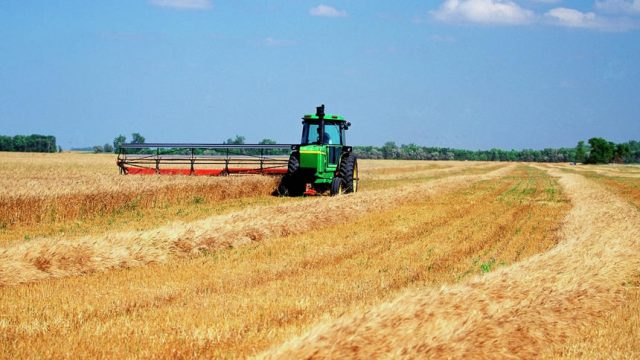What Is North Dakota’s Corporate Farming Ban Protecting Us From Again?

USA, North Dakota, Tractor in a field
This year Governor Doug Burgum signed into law a bill passed by lawmakers which waters down North Dakota’s corporate farming ban a bit.
It’s now legal for you to form a corporation for farming or ranching with your second cousin.
In fighting against that change, the traditional defenders of the corporate farming ban mouthed their traditional talking points. “Two years ago, 75% of North Dakotans voted in favor of family farms,” North Dakota Farmer’s Union President Mark Watne said in committee testimony against the bill. “Yet here we are again, taking up a bill to weaken the Corporate Faming Law.”
The implication being that any weakening of the corporate farming ban is a treat to family farms.
But that supposes the corporate farming ban is protecting North Dakota’s farms.
It’s not.
[mks_pullquote align=”left” width=”300″ size=”24″ bg_color=”#ffffff” txt_color=”#000000″]”The United States Department of Agriculture reports farm numbers dropped by 300 in the state last year, to a little more than 26,000,” KFYR news reported recently.[/mks_pullquote]
“The United States Department of Agriculture reports farm numbers dropped by 300 in the state last year, to a little more than 26,000,” KFYR news reported recently.
The reason?
“Farmers say the cost price squeeze is a big part the issue,” KFYR reports. “Whether it’s how much their crops are selling for, heavy machinery or cost of dairy, farmers say it can be hard to keep up.”
Gosh, if only there were some business model which could empower farmers to cast a wider net for investment in their operations, and deploy economies of scale which can drive down cost and risk.
That’s what corporate farming is. But that sort of thing is illegal in North Dakota thanks to people like Mr. Watne and the Farmer’s Union.
This decline in the number of farms isn’t a recent trend, either. “North Dakota has lost nearly two-thirds of its farms since the 1930s, and the number of farms continues to fall—even though the anti-corporate farming law has been in effect through all of those years,” columnist Mike Jacobs wrote back in during the 2016 election cycle.
It’s almost like the corporate farming ban doesn’t actually achieve the objective its supporters tell us it does.
You can argue that the decline in the number of farms has been driven by factors other than the corporate farming ban, and you’d be right. Innovations in farming technology and technique have allowed fewer people to farm more land.
What can we do about it? Go back to farming with teams of horses?
Yet as the science and technology of farming has improved, groups like the Farmer’s Union have wanted to keep agricultural business practices locked in the horse-and-buggy days. They cling to this shibboleth from a by-gone age for reasons that are increasingly difficult to discern.




